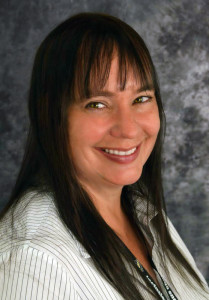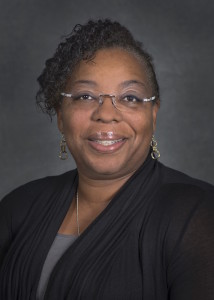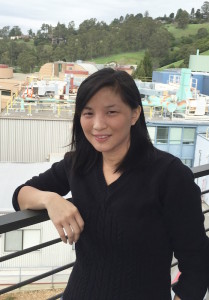March is Women’s History Month, a time to recognize and celebrate the diverse and historic accomplishments of women. The theme for 2016 is to honor women who have shaped America’s history and its future through their public service and government leadership. We profile Reva Nickelson, Shiela Dixson, and Lauren Lui.
Reva Nickelson, Director, Facilities Division
Reva Nickelson comes from a long line of women who have challenged the expectations for women of their generations.
Her great-grandmother went to college when she was in her 80s. Her grandmother was a teacher—and passionate about her career—so when she married she lied about her status so that she could keep teaching (at that time teachers were required to quit once they married). Her mom became a nurse because she loved science (one of the few “acceptable” career choices for women in her generation) and worked throughout most of Nickelson’s childhood, which was not common at that time.
“Growing up, education was a big thing in my family,” says Nickelson, director of the Facilities Division. “Going to college wasn’t really a choice; it was more a question of what would I study than of whether I would go.”
When she arrived at the University of Idaho in 1984, she was one of only a handful of women in the mechanical engineering department. Professors told her she shouldn’t be there because women weren’t smart enough to be engineers and should stay at home. Nevertheless, she forged ahead, graduated with a bachelor’s and master’s in mechanical engineering, and joined the engineering division at Idaho National Lab (INL), where she enjoyed a long and successful career.
Nickelson’s family moved around a lot when she was a child, as her dad was a mechanical engineer who supported an international project. She changed schools 13 times over the course of 12 years, moved to Europe and back multiple times, and spoke German, English, and French (although she admits she has forgotten German and French).
“I was really stretched to expand my vocabulary and history knowledge with all of those changes, but math and science stayed the same no matter where we moved,” she says. “So I really excelled in those subjects.”
Her parents encouraged her pursuit of an engineering degree, which she says helped balance the lack of support she experienced from her professors. “At one point one of the professors in my program pronounced that he was requiring me to take his class before I could graduate,” she says. “His class was considered the hardest class in the program, and I didn’t really have to take it, but I did and I got the highest grade in the class.”
She adds: “I think sometimes when you have that inner motivation, and you are just a stubborn person at heart, a comment like that can motivate you in another way, like, ‘I’ll show them.’”
After her first year at INL, Nickelson had the opportunity to become a project manager, which she says was an invaluable experience for her at such a young age. She went on to work in robotics and then environmental cleanup, where she again had the opportunity to take on a project manager role, working with the EPA and the state and using her engineering background to develop 11 patents in subsurface barrier science.
Nickelson and her husband, a chemical engineer, raised four children throughout her career at INL. Being a mother with a career was always a balancing act, she says. “If you are a woman of my generation, we were told that the right thing to do was to stay at home, but some of us wanted a career,” says Nickelson. “So there was this element of guilt, but I was always so fortunate to be able to be flexible with my work schedule so that I could make my career work and still be there for my kids.”
These days, Nickelson says she’s often still the only woman in the room at Facilities meetings and conferences. “I definitely see the gender gap in the higher level management,” she says.
She’s started a mentoring program in Facilities to try to encourage growth from within and points to widening the diversity of applicant pools as key to future change in this direction.
Nickelson’s children were all out of the house and her husband retired when she made the decision to move to California to take her position at Berkeley Lab last year. “My husband had the more demanding job in Idaho, so it has been a big change for him,” she says. “He spoils me rotten—gets up in the morning to make me breakfast, pack my lunch, and dinner is ready when I get home. I’m really lucky to have such a loving and supportive husband!”

Shiela Dixson, Senior Resource Analyst, Office of the Chief Financial Officer
When Shiela Dixson graduates from Mills College with her MBA this May, she will have achieved one of her life goals. Going to Mills has also reignited her determination to achieve another of her other life goals: creating a nonprofit for mentoring underprivileged girls.
“Going to Mills is one of the best decisions I’ve ever made,” says Dixson, a financial analyst matrixed to the Biosciences University/Hill Operations Center. “I have a mentor at Mills who truly unlocks the jewels inside of her students; she has really encouraged me to pursue my idea for a nonprofit.”
Dixson sees a lot of need for positive encouragement and mentoring in her hometown of Antioch, where there aren’t a lot of afterschool and extracurricular options for young girls. She’d like to change that. “I have friends who are teachers out in the Antioch/Brentwood area, and they often talk about kids who have so much potential but not a lot of outlets to grow that potential,” she says. “I hope one day to be able to give back by filling that niche.”
Growing up in West Virginia, Dixson was always encouraged to pursue her education. She had a strong role model in her grandfather, who worked hard to earn his college degree while working full-time and serving as a reverend in their local church. Her parents, who had never had a chance to go to college themselves while raising three girls, emphasized the importance of education and made it clear that their children were expected to go to college.
Spending her youth not too far from the Deep South, Dixson says she definitely felt both a racial and a gender divide growing up. “I didn’t understand it as a young child, but I still had to navigate through that in school,” she says. “I think it made me stronger.”
Always studious as a child, Dixson says she read every book she could get her hands on. It was in middle school that she took her first accounting class and discovered that she really enjoyed it. She focused on accounting in college and moved to California during college, thinking she would stay just for a while and experience life on this coast, but she’s been here ever since. After a couple of years at Lawrence Livermore National Lab, she moved over to Berkeley Lab eight years ago.
Dixson has always enjoyed helping people, whether it’s helping scientists secure funding for important research at work or mentoring girls in her church to encourage them to pursue their dreams.
In addition to her work as a financial analyst, Dixson is a member of the Lab Diversity & Inclusion Council’s speaker committee, which brings the diversity cultural festival and various speakers to the Lab community. Dixson and her committee colleagues have also pored over hundreds of diversity surveys and questionnaires to try to gain an understanding of the current climate.
This month she will move into a new position at Livermore Lab that she says will bring her closer to her dream of starting a nonprofit by shortening her commute and giving her more free time.
“Based on my own experience and on all those responses I’ve read, I feel across the board that there is a barrier for women in the workplace,” she said. “It’s as if women have to work a little harder, and do that in just the right way for whatever environment they are working in.”
She adds: “It’s a hard balance to accomplish. At the end of the day, I really feel like the best thing you can do is to just be your authentic self, to be honest.”
 Lauren Lui, Postdoc, Environmental Genomics and Systems Biology Division
Lauren Lui, Postdoc, Environmental Genomics and Systems Biology Division
It wasn’t until college that Lauren Lui had her first experience of being outnumbered as a female scientist. In her computer science classes at UC Davis, she was one of just a few women in a class of 40. “It felt really isolating,” she says. “The interactions are different, and the whole atmosphere in the class is different.”
And in grad school at UC Santa Cruz, Lui was the only woman in her bioinformatics cohort. Since then, she’s spent a lot of time thinking about why women are underrepresented in science and what can be done about it.
She thinks lack of encouragement is one factor. “UC Santa Cruz implemented a new program called Project AWESOME that actually increased the number of women in their computer science program just by asking teenage girls if they had considered that major,” Lui says. “I also think there are a lot of issues with ‘microaggressions,’ where little things that people do and say just continually nudge you away from a subject.”
Lui says that she didn’t really experience that kind of discouragement until grad school. “There’s an unconscious bias, and my own experiences made me realize that sometimes it’s not that people are intentionally holding women back, but they’re not realizing it,” she says. “One of the professors in my department started asking me to give talks about women in science topics to the first year grad students, so I felt that the department was acknowledging that bias was an issue.”
At UC Santa Cruz she became involved with a student-run group, Women in Science and Engineering (WiSE), serving as secretary and president and working to bring and retain more women into the science and engineering fields. “It’s something I’m really proud of, because it started out as just a group of people getting together for a few events and then grew into doing a lot of outreach, with local middle and high schools and especially underserved communities,” she says. “We just wanted to show the kids that anyone can be a scientist, no matter what you look like, or what your background is.”
Lui, who is now a postdoctoral fellow in Adam Arkin’s bioengineering lab, also started “coffee hours” at UC Santa Cruz as a way to build community among busy female grad school students. She brought in speakers to talk about everything from “imposter syndrome,” which is a common issue for women in science and engineering fields (where people lead themselves to believe that their achievements are due to luck rather than merit), to job development.
Her own family had encouraged her interest in math and science from a young age. “One of my really big influences was my grandfather,” she says. “He actually learned a lot of his engineering in the Navy and went on to work at Aerojet as a materials engineer, and he always encouraged me to go into engineering.”
She adds: “My mom was in art history, but she always encouraged my interest in math and science. I remember her sitting with me for hours helping me understand algebra.”
She’s been at Berkeley Lab for only five months, but she’s already taken on the role of secretary with the Lab’s Women Scientists and Engineers Council and says she looks forward to contributing.
“I feel like here in Berkeley there’s actually less bias than I’ve experienced in the past,” she says. “But you still have to wonder if there’s some type of bias just based on the (low) proportion of women in science.”
Lui was pleased to have an ergonomic assessment when she arrived at Berkeley Lab, since, as a five-foot tall woman, she often isn’t comfortable in labs that are designed for taller people. “Not everyone thinks about how a lot of the equipment in a lab really doesn’t work as well for some women’s smaller hands,” she says.
As a postdoc, Lui says having a good mentor is key to a female scientist’s career. “There’s so much more to your career path at this stage, so just having someone to help you navigate that and promote your work, which is something that doesn’t always come easily to women, is invaluable,” she says.
– Keri Troutman

[…] During March- Women’s History Month, Berkeley Lab recognizes and celebrates the diverse and historic accomplishments of women by honoring those who have shaped America’s history and its future through their public service and government leadership. http://diversity.lbl.gov/2016/03/14/berkeley-lab-celebrates-women-in-science-and-public-service/ […]